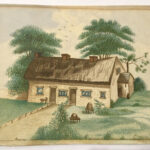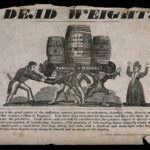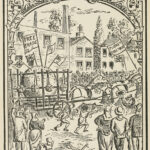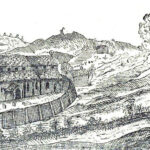4 December 1843: The Tory MP for Knaresborough recounts the death in poverty of an old woman at Harden Beck, Bingley
Times. 1843/12/08. Liberation of Mr. Oastler. Meeting in Leeds. London. Get it:
.Unedited excerpt
If an excerpt is used in the book, it will be shorter, edited and, where applicable, translated.
A public meeting, which was numerously attended, was held at the Court-house, Leeds, on Monday evening last, for the purpose of aiding the voluntary attempt now making throughout the manufacturing districts for raising money sufficient to secure the liberation of Mr. Richard Oastler from the Queen’s prison, and provide him with an annuity for the remainder of his life.
Mr. Cawood, a highly-respectable iron-founder in Leeds, was called to the chair, and there were present Mr. W.B. Ferrand, M.P., and several of the members of the Leeds Town Council, and extensive manufacturers of the town and neighbourhood.
All the speakers dwelt with admiration upon the noble efforts which Mr. Oastler had made in the cause of humanity, by his energetic and zealous support of the rights of labour, and especially of the protection of factory children, and of his searching examination of the working of the New Poor Law Bill, and his powerful denunciation of that cruel and injust law.
W.B. FERRAND, M.P., made a forcible speech, in the course of which he gave the following instance of the cruelties to use no harsher term perpetrated by the New Poor Law. He said that he had that day, in his capacity as a magistrate of the West Riding, attended a coroner’s inquest, sitting upon the body of a woman who was only one more victim to that infernal law. It appeared that four months ago a poor woman, of the name of Martha Robinson, 70 years of age, along with her daughter, who was the mother of two children, the youngest of whom was only two months old, was released from the union workhouse at Bradford, on condition that they would all live on three shillings a week. (Cries of “Shame!”) They had been accustomed to freedom, and the enjoyment of the light of heaven, and to mingle amongst friends and acquaintances, and they cheerfully accepted the boon offered them, and settled down in an hovel at Harden-beck, near Bingley. They belonged to Wilsden township, and lived beyond the boundary but some few yards. They continued to receive the relief every Monday morning from the relieving officer, who lived six miles from the place, and had to attend to the poor of six different townships, having altogether 1,150 persons to attend to. (Cries of “Shame!”) The daughter of this poor woman told the relieving officer soon after they had gone to this place that they were very badly off, and that 3s. a week was far too little for them to live upon. After this the board of guardians at Bradford, in their mercy, granted 6d. a week more; so that this family of four persons had but 3s. 6d. a week for them all to exist upon – a sum scarcely sufficient, after the – payment ef rent and coals, to keep soul and body together for two days. The daughter was half an idiot, not capable of earning her daily bread; she applied to the relieving officer for more assistance, but he turned a deaf ear to her application, saying that the board were his masters, and he had no power to relieve her. The guardian of Wilsden passed by this woman’s dwelling when her mother was dying without a bed to lie on; she called on him to come and see the state they were in, but he rode by. (Cries of “Shame, shame!” and deep sensation.) On Monday last, she applied once more to the relieving officer, and asked him to come to her house and see her mother. He replied that he had no authority to go to the house, or to grant even so much as 6d. more relief, but they might move themselves to the workhouse at Bradford. She replied, “What’s the use of removing a dying mother to the workhouse!” (Hear, hear.) She asked him for relief; but he said he could not give it. He said she was to go to the relieving officer of Bingley,who lived about a mile from the place where the poor woman was dying; and that relieving officer had excused himself that day before him (MIr. Ferrand) for not going to see the poor woman by saying that he had sufficient to do in relieving the poor of his own district and finding his way home after dark at night. (Cries of “Shame, shame!”) This half-idiot, having been refused relief at her own township, thought it useless ro apply to Bingley. On Tuesday morning last several of the neighbours went into the house and found the poor aged mother lying upon an old dirty loom, wrapped in an old sheet or two, giving up her soul to her Maker and not an atom of food or fire in the house, and her daughter going about to seek for neighbours to do that which her native town refused to do. (Cries of “Shame, shame!”) For a month Wilsden had been without a medical man in the town, and the last medical man there advertised his pill-boxes for sale. These relieving-officers and poor law boards only acted according to law, and as they were amenable to the regulations of the Poor Law Commissioners in London. The coroner’s jury had that day ainst their own consciences, returned a verdict, that “the death of the deceased had resulted from natural causes, accelerated by the want of the common necessaries of life.” [A voice.-“It ought to have been a verdict of murder.”] Residing at some few miles’ distance from the poor creature’s dwelling, he did not know anything of the case till he was asked, as a magistrate, to use his public authority that an inquest might be held on the body. He asked if it were possible even for the Christian religion to be inculcated on our countrymen, or the laws to be enforced, if such cruel oppressions as those inflicted under the New Poor Law were to be allowed to go on? (Hear, hear.) They were Englishmen, living under a Christian dipensation, told by every page in the Holy Bible to feel for and pity the poor; and to whom were those poor to apply for succour and comfort! Richard Oastler, who was now in prison, had always faithfully opposed the New Poor Law, and shown that it was contrary to the spirit of the British Constitution. He asked them, therefore, to unite cordially and unianimonsly to obtain the release of Richard Oastler, that he might exert his energies to raise the public voice against an act that was a disgrace to a Christian land. Although the law cleared the Poor Law officers, he declared emphatically in the face of that numerous and highly respectable meeting, that the New Poor Law had been guilty of the manslaughter of that woman.
Several resolutions were agreed to in promotion of the “Oastler Liberty Fund,” and various subscriptions, including one of 100l., from Mr. Wood, of the firm of Wood and Walker, of Bradford, were announced; and the meeting separated at half-past 10 o’clock in the evening, having been occupied for upwards of three hours.
Comment
Comment
3 shillings is about £19.50 at 2020 prices.
Something to say? Get in touch
Similar
 14 April 1843: John Nicholson, “the Airedale Poet,” “the Bingley Baron,” dies after falling into the Aire while drunk
14 April 1843: John Nicholson, “the Airedale Poet,” “the Bingley Baron,” dies after falling into the Aire while drunk
Comment
Comment
Cottingham’s ruling came the following day (Leeds Mercury 1835/09/26).
No time to include the rest of the article, but the Tory objection to Edward Baines Senior, included here is amusing. The addresses given by them in an 1837 borough poll book are on King Street and Park Place, with offices on Briggate (Perring 1837):

In 1838 the Leeds Mercury proposed a solution:
In the borough of Leeds, where there have never at any election been found at the poll more than about 4,000 voters, there are at the registration of the present year, no fewer than 3,400 objections! It is true that the number of objections made by each party is nearly equal; and no doubt both parties justify their conduct on the ground of self-defence; but if the bill of the last session had passed, by which it was provided that the grounds of objection should be stated in the notice, and that the persons making objections without any reasonable and probable cause, should be obliged, on the order of the Revising Barrister, to pay costs to the party objected against for the trouble and loss of time consequent upon attending to support his vote, it is highly probable that, instead of three or four thousand objection, the number would not have amounted to half that number.—Leeds Mercury.
Something to say? Get in touch
Search
Donate
Music & books
Place-People-Play: Childcare (and the Kazookestra) on the Headingley/Weetwood borders next to Meanwood Park.
Music from and about Yorkshire by Leeds's Singing Organ-Grinder.






 Bluesky
Bluesky Extwitter
Extwitter